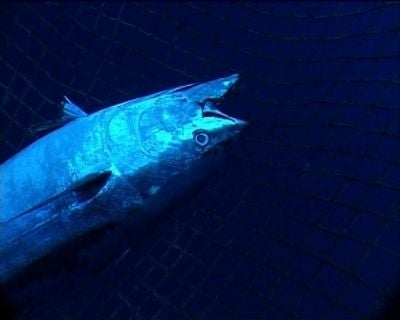Your support helps us to tell the story
From reproductive rights to climate change to Big Tech, The Independent is on the ground when the story is developing. Whether it's investigating the financials of Elon Musk's pro-Trump PAC or producing our latest documentary, 'The A Word', which shines a light on the American women fighting for reproductive rights, we know how important it is to parse out the facts from the messaging.
At such a critical moment in US history, we need reporters on the ground. Your donation allows us to keep sending journalists to speak to both sides of the story.
The Independent is trusted by Americans across the entire political spectrum. And unlike many other quality news outlets, we choose not to lock Americans out of our reporting and analysis with paywalls. We believe quality journalism should be available to everyone, paid for by those who can afford it.
Your support makes all the difference.Greenpeace Japan published its ‘red list' on July 21: the booklet contains information about endangered or under-threat species being stocked in supermarkets or served at restaurants.
Greenpeace Japan launched its first seafood ranking guide ‘red listing' in a bid to force Japanese supermarkets to remove stocks of endangered fish species from their shelves.
The Japanese version of the ‘red listing' names 15 different species of fish, including five different types of tuna, which Greenpeace believes should not be sold or consumed. On average the Japanese consume around 25 percent of the world's tuna and 45 percent of the endangered Blue Fin Tuna. Greenpeace hopes that the publication of the ‘red list' will encourage consumers and retailers to remove stocks of these fish from their plates and shelves.
The fish included on the list are those that Greenpeace believes are vulnerable to overfishing, sourced from depleted stocks or caught using methods which are damaging to ocean habitats or other species. The list includes Atlantic salmon, Bluefin tuna, Greenland halibut, monkfish, red snapper and shark amongst others. Country specific lists can be found on regional Greenpeace websites.
Red lists have previously been launched in 13 countries, the UK, USA, Austria, Netherlands, Germany, Sweden, Norway, Denmark, Canada, Spain, Portugal, New Zealand and Poland. Four other countries - the UK, Italy, Australia and New Zealand - also do additional specific work with tuna varieties.
In an attempt to encourage consumers to boycott certain stores, annual rankings of retailers in several countries including the USA, Canada and Spain are published. Each supermarket is scored on its commitment to selling sustainable fish products; according to the latest results, supermarket chain LIDL scored the highest in Spain, in Canada Loblaws came first and in the USA Target and Wegmans came out tops jointly.
Other campaigns to promote the use of sustainable seafood such as ‘Seafood See Life' have gathered momentum in the UK and are supported by celebrity chefs such as Raymond Blanc and Tom Aikens.
The Japanese argue that Bluefin Tuna, one of the most endangered marine species, is an integral part of sushi, the fish is highly prized and a single adult fish can sell for upwards of $160,000,(€124,902), and several restaurants, including celebrity sushi restaurant Nobu, continue to serve the fish.

Join our commenting forum
Join thought-provoking conversations, follow other Independent readers and see their replies
Comments